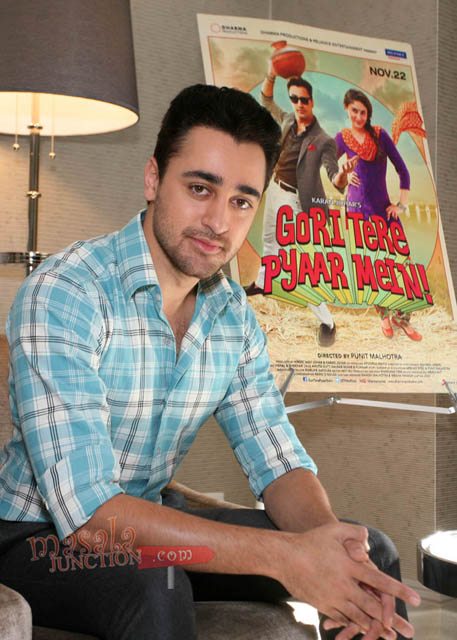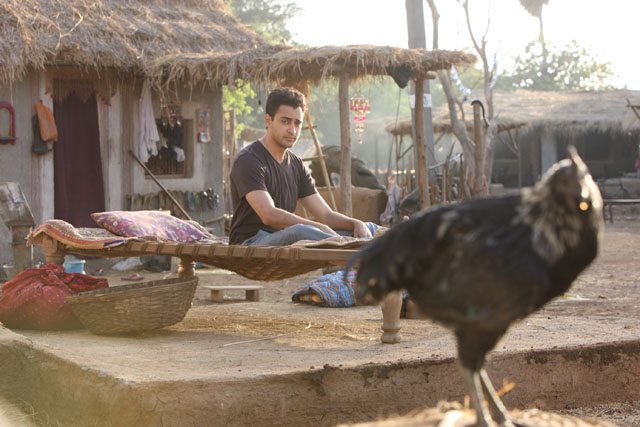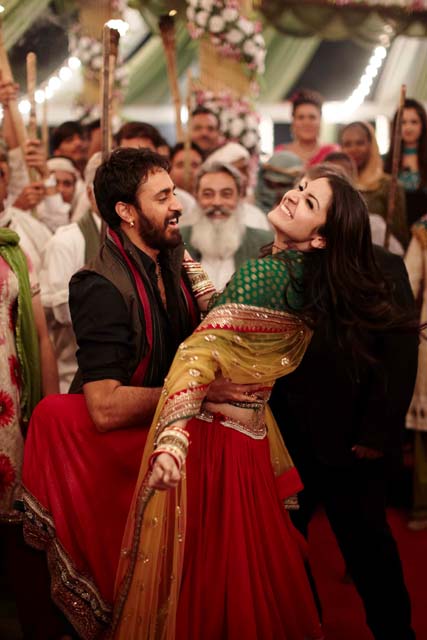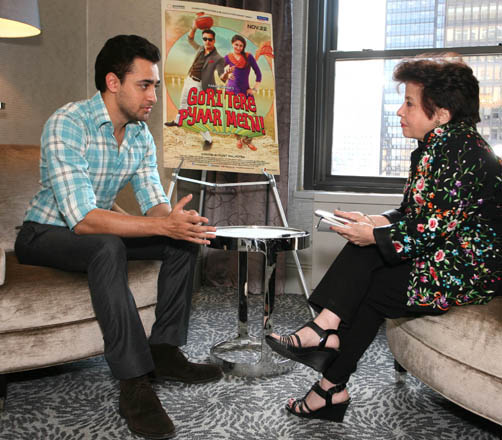Hemangini Chhatbar, Aisha Zia Khan, Monica Marwah and 65 others like this on FB – Lassi with Lavina page

Imran Khan, More Than Bollywood’s Chocolate Hero
Imran Khan comes from a famous film family – he is the grandson of director-producer Nasir Husain, creator of some of the most rocking musicals of the 70’s. He is also the nephew of actor Aamir Khan and director-producer Mansoor Khan. He acted as a child star in several movies, disappeared to America, and then re-emerged as a romantic hero in Jaane Tu, Ya Jaane Na which won him the Filmfare Award for the Best Male Debut.
Bollywood loves his romantic ‘chocolate hero’ image in films like I hate Luv Storys, Delhi Belly, Ek Main Aur Ek Tu, Matru Ki Bijli ka Mandola as well as Once Upon a Time in Mumbai Dobarra! His new release is ‘Gori Tere Pyar Mein’ and with several more in the pipeline.
Chatting with Imran Khan, you realize he’s not just about style and stardom – but about substance. Here he muses about life, family, love and social activism.
17 Questions for Imran Khan
1. Today you’re a big Bollywood star but you were once an Indian-American living right here in the US. Tell me about that.
A: Well I have been back and forth all my life. I was born in Wisconsin. I moved back to India and I went to school there, then I moved back here and I actually finished my high school in Sunnyvale, California.
2. So you were a real American teenager at that time.
A: Yeah.
3. And what was that life like?
A: I didn’t fit in very well. I think because by the time I was 16-17 I had already traveled around a lot, I had seen a lot of countries, a lot of different schools, cultures, and stuff, and Sunnyvale is a small town. And I was suddenly in a high school where most of the people over there had been born in that town, lived, and spent their entire lives over there. So for me, I didn’t fit in very well. I found it quite awkward.

4. About your schooling days in India, I was kind of startled to read that you had a stammer and facial tics. I mean how much does that influence you later when these kind of things happen in childhood?
A: It has colored my opinion on education very strongly. Because earlier, from the time I was about 4 or 5 years old, I was in a school in Bombay, Bombay Scottish School where the teachers believed in corporal punishment. If you forgot a book, if you didn’t do homework, you would be beaten with a wooden ruler or you would be caned – and I was not able to handle that, because the way my mother brought me up she had always treated me as though I was a rational being, even though I was five years old.
I was never told no you cannot do this, mom would say you cannot do this because this is the reason. She would explain something to me and I would understand it. And I still have that kind of relationship with her. When I was a teenager, she would give me responsibility, treat me like an adult and I would behave in that way. So I was used to rational thinking and rational behavior. Suddenly here there was no rational, you don’t do this – you are slapped, you are talking over here – you get caned, so I was not able to cope with that and I developed a very bad stammer, which still comes back a little bit.
5. Does it come back when you are very stressed?
A: If I am very tired, if I am very stressed, times of high emotion, it does come back sometimes.
6. It is quite remarkable how kids can get affected. I’ve also heard about some positive interactions you had while in a gurukul.
A: It was an interesting, to say the least, upbringing. I went to a gurukul from age 10-15. I was initially in a boarding school in Ooty and when the school shut down the principal of the school left and very literally said I am starting my own school – who is coming with me? About 20 of us put our hands up and said we are coming. So it was a very unusual school, we were literally out in the wilderness. We had kerosene lamps for light, there was no electricity. We got our water from a stream. We grew our own food. We grew vegetables, we plucked them, we cooked our food, we washed our clothes, we swept and swabbed the floors. I actually grew up there for five years from 10-15. As I said, very unusual upbringing.
7. And your mother seems somebody really special, I was touched to read that you adopted her last name to honor her. So tell me how it is to be brought up by a woman like her.
A: Mom and dad separated when I was very, very young and I moved back to India with mom. I mean I do have to give both of them credit. Even though they divorced their sole focus in life was to make sure that I was okay and to this date they are very close, they are very, very friendly, to the point that when we travel to the States we live with my dad.
When my dad visits India he lives in our house with us. So it was never ugly. There was no animosity between the two of them because they wanted to make sure that I would be okay. I do have to thank them for that and I do have to give them a lot of credit for that.

8. It is also interesting that it is a mixed Hindu-Muslim heritage, so have you observed both religions?
A: Not just Hindu Muslim, in fact it is everything. Hindu, Muslim, Christian. My mom’s mom was Christian. My mom’s dad was Muslim. My dad’s mom was Scottish and my dad’s dad was Bengali. So it is a very, very multicultural house.
9. Oh my gosh! You are a little India in there!
A: Yeah, I mean, right over there I have got one quarter, one quarter, one quarter, one quarter of everything. Within my family, my mom’s brother Mansoor – his wife is Christian, my own wife is Punjabi. So within our household, within our family it is very multicultural.
It is something special and we take a lot of pride in celebrating all of our mixed heritage. So we will celebrate Diwali and Christmas and Eid with exactly the same amount of enthusiasm and joy. And I try to, in whatever small way I can, set some kind of an example. I would want my kids to embrace the best of all cultures. My wife’s Punjabi-ness, my everything. It is hard for me to say I am any one thing because I am everything.
10. Does this eclectic background get reflected in your food at home? What are your absolute favorites?
A: It means that we get to eat everything, it means there are no restrictions and that there are no specialty ke yehi milta hai. I have more of a fondness towards the Muslim foods, the kebabs and keemas and biryanis because that is what my grandmother used to cook. For me my nani’s cooking was always biryani, kebab, keema. So that is somewhere engraved!

11. I had a question about the work that you do with PETA – how did that come about.
A: I did a campaign for PETA, promoting the adoption of stray animals, instead of buying dogs. In my family we have never bought dogs or cats, we have always adopted from the street. So currently I have six cats and I have two dogs.
12. Really! And they all live together peacefully?
A: Definitely. Like the people in our house. And every single one of them has been either adopted from someone who didn’t want them or picked up from the street. My own cat lives in my room, sleeps in my bed.
13. Was that a mongrel or…
A: Yeah, from the side of the road. All of them. So I did a campaign with PETA promoting adoption of animals. Apart from that, and we have reached a point right now where now we have eight animals in the house and we are kind of running out of space, practically. So mom and Avantika – both are nuts about animals as I am – so we kind of took a joint decision and we have bought some land outside of Bombay and this is my own initiative, out of pocket. I have bought some land and we are building an animal shelter.
14. Oh, that’s wonderful. Then you will have to hire somebody to look after it.
A: But for me the idea is to have it as an extension of my house. I don’t want to rely on anyone. I don’t want to be answerable to anyone. I want it to be my place. It is my land, I will build the shelter, I will hire the people that I want, I will buy the food and I will look after it myself.

15. You knew Avantika Malik from when you were both 19, had a relationship for 10 years before you finally got married. You really believe now in the institution of marriage?
A: For myself, yes I do. But I believe it is an individual choice that everyone has to take. I feel that I have seen enough people who are married but they cheat on their spouses and they are not really in love with one another and I have seen people who have been together for many, many years without ever being married.
16. So it is really about finding the right person.
A: The important thing is the commitment that you make to someone. Now whether you get a marriage certificate or not, whether you wear a ring or not that is not really relevant. For me marriage makes sense. It is something that I personally believe in, but everyone has to make their own choices.
17. Basically, your life has been all over the place, all over the map. Are you happy with the way things have turned out or is there something else that you would have liked to do – something which is kind of left undone.
A: I have got more in my life than I could have ever hoped for or asked for. I am a very fortunate person. I was the guy who thought of being a director. Suddenly here I am as an actor. I am getting to work with some of the biggest production houses, biggest directors and actresses in the country. And I have a great deal of success and fame and money. I have a family that loves me. I have got so much in my life, I have got so much more than I could ask for that I wouldn’t know where to begin.
(C) Lavina Melwani
(This article first appeared in Khabar magazine)
Related Articles
Imran Khan Goes Rustic
Matru Ki Bijlee Kan Mandola-Filmi Feast
Ek Main aur Ek Tu
